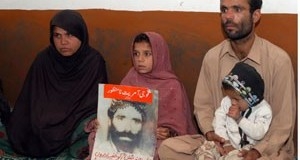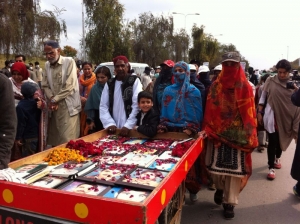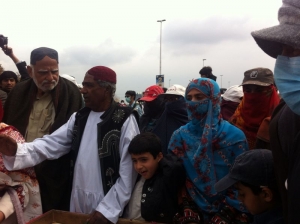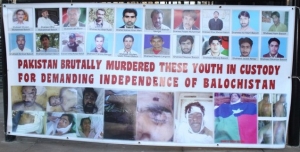One can only deduce that his contention is that if the Sarmachars had meekly submitted, the Baloch would have thrived. This flawed contention is dangerous, for while castigating the Sarmachars’ fight for lost rights, it justifies and endorses the Pakistani state’s persistent violence since forcible annexation in 1948. He forgets that the Baloch have been dispossessed of their rightful legacy in economic, social and political life they would have had had as an independent nation. The Baloch have suffered the most because they are fighting for their rights to a life with dignity and honour. An abject submission to the state’s will would have made their lives even more miserable.
In early 1940, when Germans tanks were rolling over Western Europe, Gandhi, because of his beliefs, wrote to the British Viceroy of India advising surrendering to the Germans, saying, “This manslaughter must be stopped. You are losing; if you persist, it will only result in greater bloodshed. Hitler is not a bad man….” Then, on July 4, 1940, in an open letter, he advised the British people, “Let them take possession of your beautiful island with your many beautiful buildings. You will give all these, but neither your souls, nor your minds.” Imagine the consequences if Britain had followed this advice. The argument that Hitler is not a bad man or the Pakistani state is not a bad master is as preposterous as it is dangerous. Ironically, such logic presupposes intrinsic goodness and good faith of the oppressor though he seeks solutions through force alone. Moreover, the souls and minds cannot remain free if the body and motherland are in slavery and bondage.
During the German occupation of Poland, France, etc, the partisans’ brave resistance prompted collective punishments from the Gestapo and included rounding up and shooting young men. But the people continued resisting in spite of brutalities and no one accused the partisans of betrayal for they knew that without resisting they would suffer more as their freedom would be forever jeopardised. The partisans helped the Allies in defeating Germany. Surrendering the right to resist will always have devastating consequences.
In the Vietnam War, the US, hoping to force the Vietnamese into submission, indiscriminately bombed Hanoi and Haiphong. Whenever their planes were downed, they intensified the bombings, causing more casualties and damage but that did not deter the Vietnamese from continuing to down the US planes because that was the only way of countering the illegal bombing. This downing of planes was never termed as betrayal by the people because they knew without a robust defence, the US would certainly kill and destroy more.
Pitafi suggests a South African-type peace building as a solution to the Balochistan problem but forgets that South African whites grudgingly agreed to peace after realising that without accepting black rule they would lose everything. Needless to say it was the consistent and brave struggle of Nelson Mandela and the ANC, who too were at times accused of bringing down repression on the black South Africans with their resistance, which secured the rights for blacks in their homeland.
Peace in South Africa became possible only when blacks were accepted as equals. Here the state cares only about what Pitafi calls, ‘44 percent of the country’s landmass’ and not the people; for them people are expendable. Moreover, who would this peace be negotiated by? Certainly not by Raisani and his corrupt cronies because they have already bartered away Baloch rights for power and pelf tainted with Baloch blood and do not represent the Baloch. Incidentally, Pakistan refuses to talk to ‘those who burn Pakistan’s flag’ but they are the only ones who really matter.
Violence should never be the preferred option but one is forced to ask if the Vietnamese and Algerian leaders were wrong to resist US and French colonialism, or was Allende wrong when he died fighting and came to symbolise the Chilean people’s resistance to the Pinochet dictatorship? I also wonder what would have Spartacus and his companions thought if they were told that by resisting the Romans they were betraying the slaves.
The Sarmachars have not betrayed the Baloch but have upheld their rights and dignity in spite of suffering immeasurably at the hands of the state. They have thwarted the state’s plan to deprive the Baloch of all their rights, resources and historical legacy. The Sarmachars with their sacrifices have assumed the role of hope, voice and protectors of the Baloch people. The real betrayal of Balochistan is from those who have either kept quiet or abetted those denying the Baloch their rights. Castigating those who resist injustices only exonerates the state of its crimes.
The writer has an association with the Baloch rights movement going back to the early 1970s. He tweets at mmatalpur and can be contacted at mmatalpur@gmail.com






